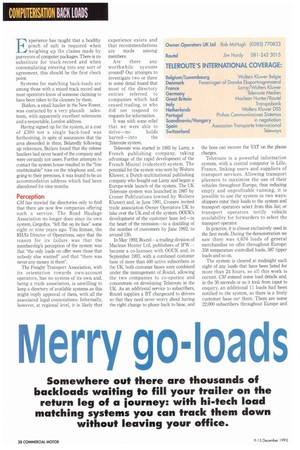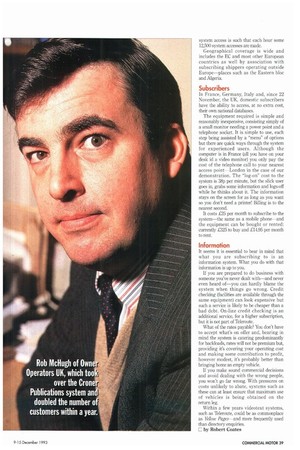F j xperience has taught that a healthy pinch of salt is required when
Page 40

Page 41

If you've noticed an error in this article please click here to report it so we can fix it.
weighing up the claims made by purveyors of computer packages. There is no substitute for track-record and when contemplating entering into any sort of agreement, this should be the first check point.
Systems for matching back-loads are among those with a mixed track record and most operators know of someone claiming to have been taken to the cleaners by them.
Butlers, a small haulier in the New Forest, was contacted by a very plausib salesteam, with apparently excellent references and a respectable. London address.
Having signed up for the system, at a cost of 000 not a single back-load was forthcoming, in spite of assurances that the area abounded in them, Belatedly following up references, Butlers found that the referee hauliers had never heard of the company and were certainly not users Further attempts to contact the system house resulted in the "line unobtainable" tone on the telephone and, on going to their premises, it was found to be an accommodation address which had been abandoned for nine months.
Perception
CM has trawled the directories only to find that there are now few companies offering such a service. The Road Haulage Association no longer does since its own system, Cargofax, "fell flat on its face" some eight or nine years ago. Tim Inman, the RHA's Director of Operations, says that the reason for its failure was that the membership's perception of the system was that "the only loads on offer were those that nobody else wanted" and that "there was never any money in them".
The Freight Transport Association, with its orientation towards own-account operators, has no system of its own and, being a trade association, is unwilling to keep a directory of available systems as this might imply approval of them, with all the associated legal connotations. Informally, however, at regional level, it is likely that experience exists and that recommendations are made among members.
Are there any worthwhile systems around? Our attempts to investigate two or three in some detail found that most of the directory entries referred to companies which had ceased trading, or who did not respond to requests for information.
It was with some relief that we were able to delve—no holds barred—into the Teleroute system.
Teleroute was started in 1985 by Lamy, a French publishing company, taking advantage of the rapid development of the French Minitel (videotext) system. The potential for the system was seen by Wolters Kluwer, a Dutch-multinational publishing company who bought out Lamy and began a Europe-wide launch of the system. The UK Teleroute system was launched in 1987 by Croner Publications (owned by Wolters Kluwer) and, in June 1991, Croners invited trade association Owner Operators UK to take over the UK end of the system. 00UKs development of the customer base led—in the heart of the recession—to a doubling of the number of customers by June 1992, to around 130.
In May 1992, Routel—a trading division of Maclean Hunter Ltd, publishers of IFW became a co-licensee with 00UK and, in September 1993, with a combined customer base of more than 400 active subscribers in the UK, both customer bases were combined under the management of Routel, allowing the two companies to co-operate and concentrate on developing Teleroute in the UK. As an additional service to subscribers, Routel supplies a BT chargecard to drivers so that they need never worry about having the right change to phone back to base, and the boss can recover the VAT on the phone charges.
Teleroute is a powerful information system, with a central computer in Lille, France, linking users and suppliers of transport services. Allowing transport planners to maximise the use of their vehicles throughout Europe, thus reducing empty and unprofitable running, it is possible to use the system in two ways: shippers enter their loads to the system and transport operators select from this list; or transport operators notify vehicle availability for forwarders to select the transport operator.
In practice, it is almost exclusively used in the first mode. During the demonstration we saw there was 4,676 loads of general merchandise on offer throughout Europe: 358 temperature controlled loads, 587 tipper loads and so on.
The system is cleared at midnight each night of any loads that have been listed for more than 24 hours, so all this work is current. CM entered some load details and, in the 30 seconds or so it took from input to enquiry, an additional 11 loads had been notified to the system, so there is a lively customer base ouf there. There are some 22,000 subscribers throughout Europe and
system access is such that each hour some 12,500 system accesses are made.
Geographical coverage is wide and includes the EC and most other European countries as well by association with subscribing shippers operating outside Europe—places such as the Eastern bloc and Algeria.
Subscribers
In France, Germany, Italy and, since 22 November, the UK, domestic subscribers have the ability to access, at no extra cost, their own national databases.
The equipment required is simple and reasonably inexpensive, consisting simply of a small monitor needing a power point and a telephone socket. It is simple to use, each step being assisted by a "menu" of options but there are quick ways through the system for experienced users. Although the computer is in France (all you have on your desk id a video monitor) you only pay the cost of the telephone call to your nearest access point London in the case of our demonstration. The "log-on" cost to the system is 38p per minute, but the slick user goes in, grabs some information and logs-off while he thinks about it. The information stays on the screen for as long as you want so you don't need a printer! Billing is to the nearest second.
It costs £25 per month to subscribe to the system—the same as a mobile phone—and the equipment can be bought or rented: currently £325 to buy and £14.95 per month to rent.
Information
It seems it is essential to bear in mind that what you are subscribing to is an information system. What you do with that information is up to you.
If you are prepared to do business with someone you've never dealt with—and never even heard of—you can hardly blame the system when things go wrong. Credit checking (facilities are available through the same equipment) can look expensive but such a service is likely to be cheaper than a bad debt. On-line credit checking is an additional service, for a higher subscription, hut it is not part of Teleroute.
What of the rates payable? You don't have to accept what's on offer and, bearing in mind the system is catering predominantly for backloads, rates will not be premium but, providing it's covering your operating cost and making some contribution to profit, however modest, it's probably better than bringing home an empty vehicle.
If you make sound commercial decisions and avoid dealing with the wrong people, you won't go far wrong. With pressures on costs unlikely to abate, systems such as these can at least ensure that maximum use of vehicles is being obtained on the return leg.
Within a few years videotext systems, such as Teleroute, could be as commonplace as Yellow Pages and more frequently used than directory enquiries. E by Robert Coates


























































































